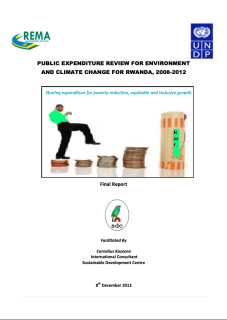
This baseline report firstly encapsulates the expenditure for the environment, natural resources, and climate change in Rwanda and secondly, the public and private institutions and those of nonstate actors assessing the distributional equity for poverty reduction and inclusive growth. It was done under the auspices of the UNDP-UNEP Poverty-Environment Initiative in support of Rwanda‘s implementation of its second Economic Development and Poverty Reduction Strategy (EDPRS2) using the lessons from the implementation of EDPRS 1.
The programme has entered the phase of long-term capacity development to fully integrate environmental sustainability in the planning, budgeting, and monitoring frameworks at sectoral and decentralized levels. Accordingly, the purpose of the review was to support that capacity development and to evaluate the adequacy, efficiency, and effectiveness of past expenditures from 2008 to 2012, which happens to have been the lifespan of EDPRS 1.
The report is therefore timely as an input to the engagement processes of the sector working group, and identification of potential future investments. Its emphasis to make visible climate change and expenditure by non-state actors makes it different from the public environmental expenditure review of 2009.
